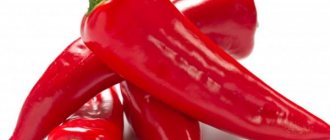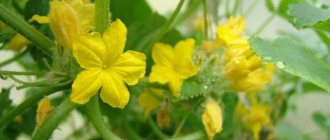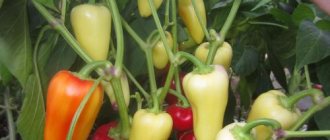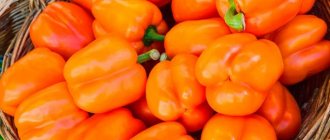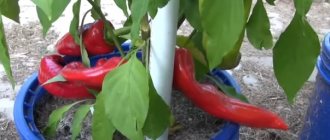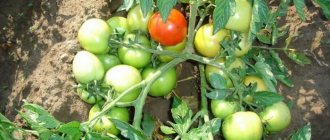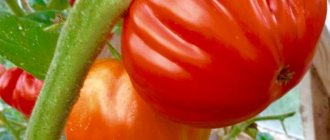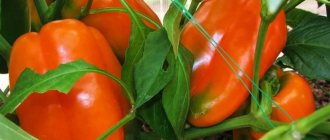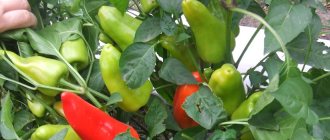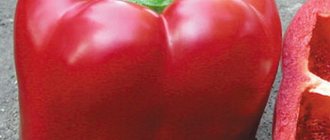Sweet bell peppers, once brought from the distant shores of North America, have taken root well in our latitudes. It is grown not only in individual garden plots, but also on an industrial scale. In this case, preference is given only to the best varieties that show excellent results over a long period of time. These varieties include Ali Baba pepper.
general description
Among the various varieties, our current one can take one of the highest places. That is, “Ali Baba” is praised by summer residents; they have already tested it on their plots. It was bred in Russia, therefore the variety is most adapted to the country’s changing climate.
The highest yields are obtained in the temperate zone and in the south, but northern regions can also grow this variety. Of course, in such places it is preferable to use greenhouses.
Sowing seedlings begins early, but already at the beginning of summer you can enjoy the vitamins. “Ali Baba” cannot be called capricious in cultivation, and besides, it is compact.
We will tell you all the techniques, and then we advise you to find out in detail about the indicators - they are decent.
Only plant-based products contain a lot of fiber, which our gastrointestinal tract needs. Pepper can be eaten both fresh and processed - it is very tasty, healthy, and the coarse fiber will help improve health.
Main growing area
The “Ali Baba” sweet pepper variety was bred by Russian breeders, so it is maximally adapted to the rather specific conditions of our climatic zone. This type of plant is characterized by high productivity, withstands sudden and quite significant temperature changes, and is also immune to most diseases.
It is best to grow this crop in Eastern Europe and Western Asia, that is, in the temperate climate zone. The variety of sweet bell pepper “Ali Baba”, thanks to the efforts of its creators, is resistant to uneven watering and is quite easy to care for. Thanks to the many advantages of the crop, its cultivation can be found not only in greenhouses and on an industrial scale, but also on private land plots.
Varietal characteristics
- Sweet pepper "Ali Baba" is early ripening - the first harvest is produced 100-105 days after the seedlings emerge.
- Light-loving - light should fall on the seedlings approximately 12 hours a day, from 8 am.
- The bushes are very compact - only 45 cm.
- The number of leaves is medium, they are rich green in color.
- In the technical ripeness phase, the pepper is soft green, then orange and, when fully ripe, bright and red.
- The pulp is not very thick - 5 mm, but the variety is juicy and tasty.
- Unpretentious to grow.
- Suitable for cultivation in greenhouses and open ground.
- Has a universal table purpose.
- The fruits are drooping, that is, they grow downwards, the shape is a cone with a sharp tip.
- The peculiarity of this variety is that the stalk is not pressed inside the cone.
- Stores and transports well.
- Fruit weight is up to 350 grams, one bush produces up to 10 pieces. Large-fruited variety.
- Resistant to major pepper diseases.
From the varietal characteristics we can clearly see that the “Ali Baba” sweet pepper can become a permanent resident of the garden bed, especially if you have very little space or only a small greenhouse. We advise you to take a closer look at this pepper.
Description and characteristics of the variety
Bell pepper Ali Baba is included in the early ripening category; full ripening is observed 90-105 days after germination. The vegetable grows in compact low-growing bushes, the length of the shoots does not exceed 40-45 cm. The pepper is well leafy, spreading is moderate. The leaves are dark green, well cover the fruits in the heat from the scorching sun.
The agro variety is characterized by friendly ripening. The fruits have an attractive appearance. What are the signs of peppers:
- flattened, conical shape;
- large sizes, average weight from 150 to 300 g;
- pointed nose;
- the color changes as it ripens (at first the fruits are green, then creamy yellow, and at the stage of full ripeness they are deep red);
- walls thickened to 6-8 mm;
- the surface is durable, glossy, smooth;
- the flesh is fleshy and juicy.
Peppers have an exquisite taste and aroma. They are cut into salads, casseroles, stuffed dishes are prepared from them, put in borscht and soups, frozen whole and as part of a platter.
Diseases and pests
As we already indicated a little earlier, the variety is resistant to diseases, which is very good. Diseases destroy the crop quickly - all efforts may be in vain. Therefore, for everyone who cannot spend a lot of time in the garden beds and does not understand the ailments of crops, it is better to immediately choose resistant varieties. But it is still important to observe crop rotation and prepare the soil well on the site.
Peppers are not planted after nightshade crops. The best predecessors are greens, legumes, cabbage, herbs, and pumpkin.
It cannot be said that this variety is very bothered by insects, but still it does not change from year to year, and various factors can play a role here - weather, the presence of other crops, the condition of neighboring plots. For example, if you have an abandoned field nearby, then parasites will probably want to feast on the crops in your garden.
This means that you need to monitor and periodically carefully examine the bushes from all sides. Aphids, mites, Colorado potato beetle larvae or butterflies can settle on the inside of the leaves. You need to carry out the treatment immediately - if the attack happened before flowering, then you can buy insecticides; if the pepper is already blooming and bearing fruit, then biological preparations and traditional methods are used.
Pests
Pepper pests can affect plants if unfavorable weather conditions occur, crop rotation rules are violated, or other nightshades are planted next to them. Ali Baba peppers are mainly threatened by slugs, aphids and mites. To prevent pests from entering your area or to minimize their invasion, it is useful to take certain simple measures:
- Spraying the bushes with herbal infusions will help against aphids. For infusions, it is useful to use potato tops, tomatoes, onion peels, yarrow, tansy or wormwood; can be sprayed with a solution of wood ash or tobacco dust (1 glass of ash or tobacco per 10 liters of hot water). Leave the solution for a day, strain before use, add soap (liquid soap is possible). Spray the plants once every 5 days.
Advice! To add to infusions, decoctions, solutions, you can prepare a soap concentrate: dissolve grated laundry soap in water, keep in a separate container, add to the infusion or decoction needed for spraying as needed.
- Slugs are active in the evenings and at night. The beds must be kept clean, weeds must be regularly removed, loosened by scattering ground pepper, mustard, lime, chalk, and coffee grounds over the soil. It is good to sow parsley in the spaces between the rows, which slugs do not like.
- For ticks, spraying the bushes with infusions of chopped onion or garlic, dandelion, and adding liquid soap to the infusion helps a lot. The reverse side of the leaves should be treated especially. Among the preparations you can use Fitoverm, Iskra, Inta-Vir and other insecticides.
It is much easier to initially protect pepper bushes from pests:
- do not plant other nightshades next to peppers;
- do not plant peppers in areas where tomatoes, potatoes, physalis, and nightshade grew before;
- plant legumes, parsley, herbs, calendula, marigolds and other garden plants next to the pepper.
If you follow the necessary preventive measures, Ali Baba pepper will delight you with a good harvest of tasty and sweet fruits.
Advantages and disadvantages
So, let’s summarize the description of the “Ali Baba” sweet pepper variety, identify weaknesses, if any, and combine the advantages.
Advantages of the variety:
- productivity, fruit quality, relative unpretentiousness;
- universal cultivation and table use;
- compactness;
- the stalk is at the top, it is convenient to remove it;
- low foliage, that is, light will penetrate well and the crop will ripen faster.
Disadvantages of the variety:
- possible pests;
- demands on light;
- not very thick pulp - less suitable for stuffing than thick-walled varieties.
So you have become quite familiar with the Ali Baba pepper. To grow it, you need to perform some techniques, which will be discussed further.
May be interesting Pepper “Bychok”: a sought-after variety with high quality fruits Variety “Stuttgarter Riesen” - from seed to bulb If you want potatoes in May, plant “Zhukovsky early”
This variety looks very decorative in the garden, as the bushes are lush, and the fruits shimmer with different colors of glossy skin during ripening.
Recommendations for cultivation
The most important condition for obtaining an excellent harvest of this variety of sweet pepper is properly prepared seedlings. The best month to prepare it is February. Ali Baba seedlings should be prepared in the same way as for tomatoes. In addition, there are several recommendations, the implementation of which will allow you to obtain strong and healthy seedlings of the Ali Baba variety of sweet pepper:
- Only live seeds should be planted. Living seeds can be identified by immersing them in water. Only those seeds that have sunk to the bottom are suitable for planting. The floating seeds are empty and will not germinate, so they can be thrown away.
- Seeds suitable for planting are soaked in water for several days.
Following these simple recommendations will allow you to obtain strong seedlings of Ali Baba sweet pepper.
Plants of this variety are planted in a permanent location in May - June. To ensure normal growth, at least 40 cm must be left between neighboring plants. The same distance should be between their rows.
Caring for Ali Baba sweet pepper bushes includes:
- Regular watering. For it you should take only warm, settled water. Each plant should receive 1 to 2 liters of water. In this case, overhead watering is possible only before the beginning of the budding period. During flowering and until the end of harvesting, watering should be carried out only at the base of the bush.
- Fertilizing with mineral and organic fertilizers. Its frequency should not exceed 2 times a month. Fertilizers are applied only under the bush so as not to damage the foliage.
- Loosening and weeding.
You can learn more about caring for sweet peppers from the video: https://www.youtube.com/watch?v=LxTIGtAF7Cw
Subject to agrotechnical care requirements, the Ali Baba variety will bear fruit abundantly from July to September.
Agricultural technology "Ali Baba"
Sowing seeds
Good seeds are those that were harvested last season, but even these need to be checked for germination before sowing. The method is always the same - water and a little salt, soon the good seeds will fall to the bottom, the empty ones will float on the surface. Always buy a pack in reserve, as not all manufacturers are conscientious. Afterwards, experienced summer residents recommend soaking the seeds of the “Ali Baba” sweet pepper in a growth stimulator. This is necessary not only for friendly shoots, but also for good immunity and rapid growth and development.
We have already told you that this pepper can be planted quite early - from February, but provided that the seedlings, when they emerge, will receive good lighting from approximately 8 am to 8 pm. To do this, it is worth purchasing lamps, ordinary ones are inexpensive, special ones are more efficient, but they are not cheap. In any case, this device will be useful to you for many years. Your seedlings will be strong and healthy, they will begin to bear fruit early, and the quality of the fruit will be at its best.
Of course, this still requires fertile soil, and sterile soil at that. Ready-made soil and peat pots are the best option. The root is not injured, saving time on picking and soil preparation. If you want to experience the whole process, then mix humus, soil from the garden, peat, a little ash and complex fertilizer (according to the instructions) in equal parts. This is the stage where plants need the most nitrogen to grow green. Spray all the soil with a solution of manganese for disinfection. Sowing is carried out to a depth of 1-1.5 cm, with watering and under film.
Pepper
- 1 Description of the variety
- 2 Cultivation
- 3 Advantages of the variety
- 4 Reviews
Sweet bell pepper of the “Ali Baba” variety has long become the favorite of all summer residents, and this is not surprising because, despite its heat-loving nature, it survives well in our cold regions and tolerates any precipitation and frost.
This is one of the most common varieties; it is grown both in garden plots and on an industrial scale.
Description of the variety
The variety "Ali Baba" is early ripening, the fruits ripen in just 100 days after planting the seeds. Despite this, the yield of this variety is quite high; up to 10 fruits can be harvested from one bush.
A distinctive feature of these peppers is their small height, so summer residents who do not have a large greenhouse can plant them in the beds after first installing metal arcs on them and covering them with film.
The fruits of "Ali Baba" have an oblong cone shape with a sharp tip. It is worth noting that in this variety the stalk is not pressed into the fruit.
A vegetable that has reached biological ripeness can reach 300 grams in weight. The walls of pepper have an average thickness of approximately 5-6 mm.
The color can change as it ripens, from apricot to red or even burgundy. The skin of the fruit is hard to the touch and has a glossy sheen.
Bell pepper has a bright taste, the flesh is juicy and sweet. “Ali Baba” is ideal for stuffing, use in fresh vegetable salads, for preparing various preserves, lecho, etc.
Growing
Apricot Favorite peppers are grown using seedlings, which need to be planted and prepared on time. It can be planted in February, but before that the seeds must be prepared. First you need to check which seeds are alive.
To do this, throw them into a glass of water, and those that sink to the bottom will give you a good harvest in the future. Those that float to the surface are dead seeds. After checking, leave the seeds in a damp cloth for 2-3 days.
The fabric can be soaked in a growth stimulator or a solution of mineral fertilizers.
You may be interested in:
Pepper is sensitive to the composition of the soil, so even at the seedling stage it is necessary to feed the plants with mineral fertilizers (for example, Azofoska, Nitrophoska, etc.).
During the first weeks, you need to especially carefully monitor the temperature; peppers do not like cold, so maintain a temperature of 23-25°C. It is necessary to feed the seedlings once approximately 14 days after planting the seeds.
If you live in a northern climate, then closer to the summer season you need to harden the peppers: ventilate the room more often or take them out to an open window.
You can plant seedlings at your summer cottage either in open ground or in a polycarbonate greenhouse. This should be done in late May-early June, when approximately 70 days have passed after planting the seeds. Peppers grow well in the soil in which they previously grew:
- mustard;
- cabbage;
- radish;
- turnip.
Before planting, it is best to fertilize the soil with organic matter, for example, a solution of chicken manure, and then thoroughly loosen and water it. It is necessary to plant bushes at a distance of at least 40 cm, since the bushes are very tall and spreading, and they also need a sufficient amount of sunlight and air.
Bell peppers need to be fed several times a season, and also carefully monitor soil moisture. During harvest, to help new ovaries, you need to remove long shoots and trim off yellowed leaves. If the bush will bend under the weight of the fruit, it is necessary to provide vertical support.
When caring for the Ali Baba variety, keep in mind the following features:
- Watering should only be done with warm, settled water; it is best to water at the root, without touching the leaves and stem.
- Fertilizers should also be applied only at the roots.
- Carefully monitor the degree of soil loosening and moisture.
Advantages of the variety
- Resistance to many diseases.
- Excellent taste.
- The fruits ripen quickly.
- Good yield.
Reviews
Ekaterina: “An excellent variety, just right for my small greenhouse. I didn’t have to take much care; I fed it with Nitrophoska 3 times during the season and that’s it. The peppers turned out to be bright red, tasty and juicy.” Pavel: “Ali Baba” grows well even in northern latitudes, it withstood all the frosts and winds with a bang, the main thing is to water it well and don’t forget to loosen the soil, then the harvest will definitely come will delight your whole family.” Anastasia: “I’ve been growing “Ali Baba” for several years now, I really like it. Unpretentious, does not require much care, can grow even in the Leningrad region. I keep it frozen at home and can be used for salads or for making beef roasts.”
Source: https://sveklon.ru/perets-ali-baba
Features of growing seedlings
One of the main conditions for obtaining high yields of “Ali Baba” sweet pepper is seedlings prepared in accordance with some generally accepted rules and compliance with the basic conditions for planting them. February is considered the best period for preparing seedlings, because at least 100 days must pass from the moment of sowing the seeds to planting the plant in the ground. In general, the process of preparing plants for planting is in many ways similar to growing tomatoes.
To get a healthy and strong Ali Baba pepper, try to adhere to the following recommendations:
- Only live seeds are suitable for planting. Important! To determine the quality of sweet pepper seeds available for planting, immerse them in a small container of clean water. Floating grains can be thrown away as they are empty and will not germinate. At the same time, the seeds that have sunk to the bottom can be safely used for planting seedlings, as they will ensure fairly strong and confident seedlings.
- Before placing in the ground, the grains should be soaked in water for several days. For reference! To obtain stronger and disease-resistant seedlings, any growth stimulant can be used when soaking seeds. Good examples of such drugs are the compositions of such brands as: “Benefit”, “Bioglobin”, “Ovary”, “Rival”, etc.
- It is best to carry out the seedling preparation procedure without diving, so experts recommend sowing the seeds in peat cups to a depth of about 1.5-2 cm.
- Until the seedlings germinate, the containers are placed under glass or film and placed in a warm, well-lit place.
- After germination, pepper needs to maintain a certain temperature regime. During the day, the plant needs an air temperature in the range of 25-27°C, and at night - at least 13-15°C.
- Before planting seedlings in an area with open ground, be sure to harden them, which involves maintaining a night temperature of 10-13°C.
By following these simple recommendations, it will be enough for you to simply grow high-quality and strong seedlings of the “Ali Baba” sweet bell pepper at home. It is worth noting that to obtain strong plants, you should avoid drafts and provide additional lighting from approximately 8.00 to 20.00.
It is recommended to plant this plant variety in a place of permanent growth in May - June, when the soil has warmed up sufficiently and the night temperature does not fall below 10°C. To ensure optimal growth conditions, there should be a distance of at least 40 cm between bushes.
Pepper care
Growing and caring for the Ali Baba variety consists of the following recommendations:
- Before planting the seeds, soak them in a growth stimulator. Plants from soaked seeds are stronger and more resistant to diseases. You can use the drug "Immunocytophyte". The solution will require 10-15 ml. water and one tablet. Soak the seeds for 3-12 hours. Sow the seeds to a depth of no more than 2 cm. It is recommended to sow the seeds in pots so as not to disturb the plants before transplanting into the holes. The air temperature in greenhouses should be at least 25 degrees, but not more than 28. Before planting, gradually reduce the temperature to 10-13 degrees, 10 days before planting in open ground.
- It is advisable to plant peppers after carrots, cabbage, and beets. Plant up to 5 plants per square meter. If watering is not abundant, the consumption per square meter will be 10 liters, or 2-3 liters. for 1 plant. Don't forget to remove weeds and loosen the soil.
- Fertilizer feeding occurs 2-3 times. The first is carried out during planting, the second during the formation of fruits. The consumption of potassium and phosphorus fertilizers is 30-50 grams per 1 m². Until the fruits are fully ripened, you just have to watch for the appearance of diseases or pests.
Advantages and disadvantages of the Ali Baba variety
- Pepper fruits ripen quickly;
- the fruit mass is large;
- tolerates sudden changes in weather conditions well;
- has an excellent presentation;
- the taste is pleasant.
- susceptible to pests;
- during growth it does not tolerate drafts and requires good lighting.
Pepper "Ali Baba" was grown in greenhouse conditions. The bushes are low, well leafed. An average of 8-9 fruits were formed on one. After the first harvest, the ovary continued to form. The plants did not get sick in the greenhouse. The harvest was excellent. I liked the taste. Used to prepare various dishes. I didn’t regret planting this variety.
“Ali Baba” pepper was planted in open ground. The seedlings grew strong. Before planting, the seeds were soaked in a growth stimulant, I don’t remember the name. Peppers were planted in peat pots. Firstly, it is convenient for planting in open ground, and secondly, they can be planted directly in these pots. The harvest was normal, we had enough. It was only during the growing season that a tick attacked and I treated it with Akarin.
